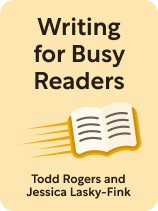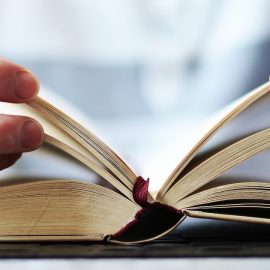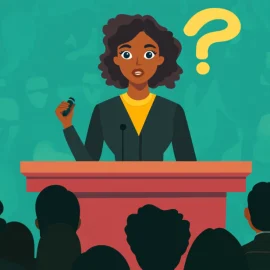

This article is an excerpt from the Shortform book guide to "Writing for Busy Readers" by Todd Rogers and Jessica Lasky-Fink. Shortform has the world's best summaries and analyses of books you should be reading.
Like this article? Sign up for a free trial here.
When you write, does it have purpose? Do you tailor your writing to your readers?
According to behavioral scientists Todd Rogers and Jessica Lasky-Fink, successful writers write effectively. This means they convince readers that their content is worth engaging with, and they get their message across in a way that’s easy for readers to understand.
Continue reading to learn what effective writing is from the book Writing for Busy Readers.
Why You Should Write Effectively
Every piece of writing has a purpose—for example, you might write marketing emails to alert customers to flash sales or political flyers to inform citizens about a politician’s campaign. (Shortform note: Experts say most writing serves multiple purposes at the same time. For example, suppose you’re writing about a politician’s campaign, and your primary goal is to persuade readers to support the candidate. To accomplish this purpose, you might have sub-goals like informing readers about the candidate’s policies and evoking emotion by sharing a story about how they helped someone in the community. )
To achieve your writing’s purpose, Rogers and Lasky-Fink argue that you must write effectively. Let’s explore what that means and its benefits.
What Is Effective Writing?
So, what exactly is effective writing? According to Rogers and Lasky-Fink, effective writing conveys essential information without unnecessary complexity. It’s purposeful—that is, it’s tailored to have a particular impact on readers. It’s also clear, concise, and direct to accommodate readers’ time limitations. (Shortform note: Some experts refer to effective writing as reader-centered writing, as opposed to writing that’s mainly writer-centric. For example, in school, you likely wrote essays to showcase what you knew, rather than to clearly inform or persuade an outside reader. Reader-centered writing shifts the focus: You consider what the reader needs to understand, feel, or do, and you shape the writing accordingly.)
The authors note that almost every reader has limited time: The world is busier than ever, and we’re constantly inundated with information. To cut through the noise, effective writers make it easy for readers to quickly understand their message, its relevance and importance, and how to act on the information it contains. As we’ll discuss, this convinces readers that your content is worth engaging with, ensuring that your ideas have a greater impact by reaching more people.
(Shortform note: Experts agree with Rogers and Lasky-Fink that we’re inundated with information all the time. They refer to this phenomenon as “infobesity” and explain that it overwhelms our cognitive capacity, making it harder to focus, retain information, or make decisions. People naturally counter infobesity by ignoring content that’s dense, unfocused, or lacking in value—so, as Rogers and Lasky-Fink note, effective writing is more likely to land with your audience.)
Effective writing is distinct from literary writing—the kind of writing used in novels and other creative content—which is intentionally complex because readers enjoy taking time to parse its meaning and appreciate the beauty of its language. In contrast, Rogers and Lasky-Fink say to use effective writing when trying to convey information, solve problems, or prompt specific actions. For example, you can use effective writing techniques to announce an event, provide instructions, and convince others of your viewpoint.
(Shortform note: Rogers and Lasky-Fink understand effective writing as the opposite of literary writing, but in practice, many writers blend elements of both. This is common in creative nonfiction genres like literary journalism, which straddles the line between aesthetic expression and clear communication. Writers like Joan Didion and Ta-Nehisi Coates, for example, use vivid language and stylistic flourishes while also presenting information or arguments in a way that’s accessible and purposeful.)

———End of Preview———
Like what you just read? Read the rest of the world's best book summary and analysis of Todd Rogers and Jessica Lasky-Fink's "Writing for Busy Readers" at Shortform.
Here's what you'll find in our full Writing for Busy Readers summary:
- Why some writers are so successful at connecting with readers while others aren't
- How to make your writing more impactful and increase your reach
- That how you communicate can be just as important as what you say






